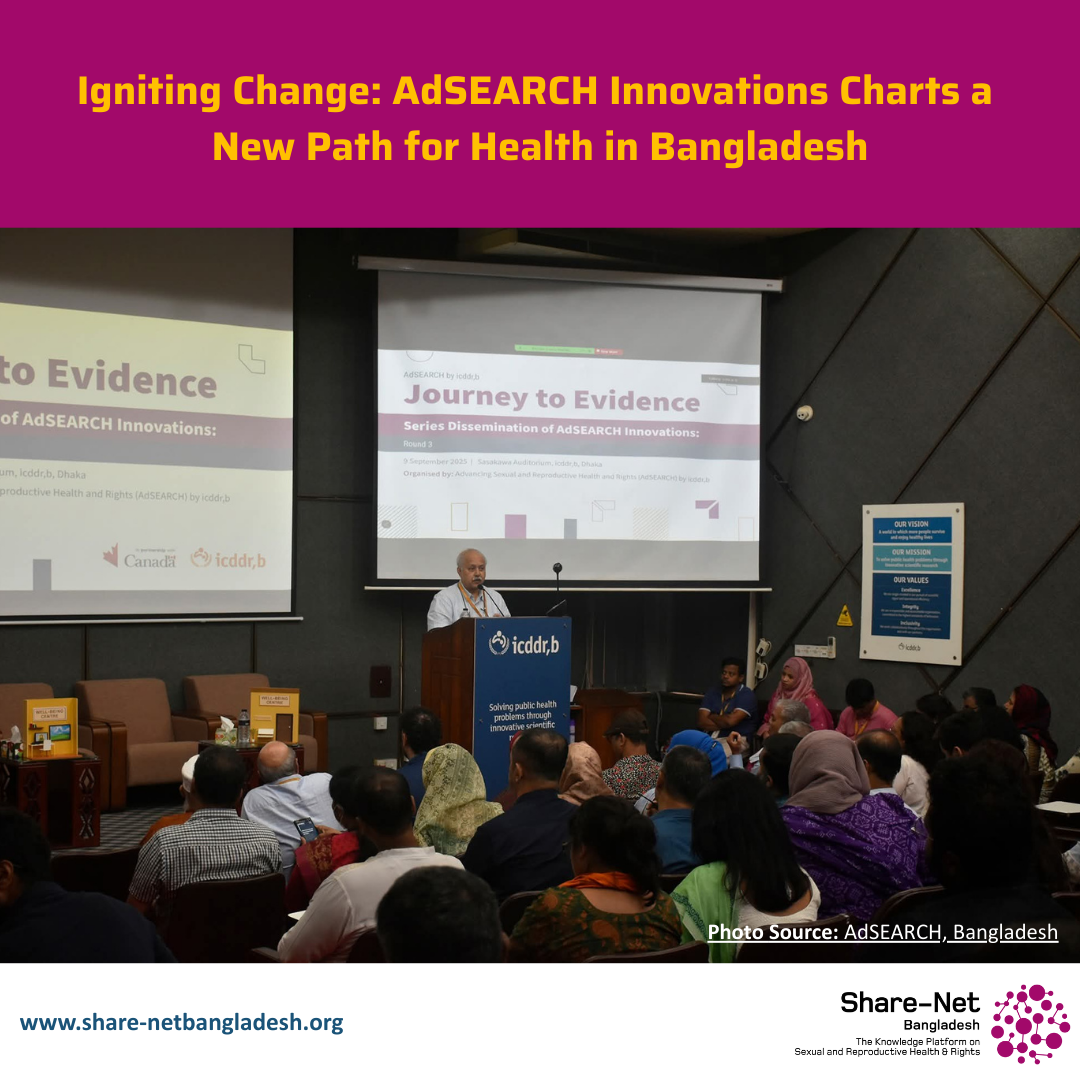Igniting Change: AdSEARCH Innovations Charts a New Path for Health in Bangladesh
The dissemination seminar, titled ‘Journey to Evidence, Series Dissemination of AdSEARCH Innovations: Round 3’, held at the Sasakawa Auditorium on September 9, 2025, served as a pivotal platform for icddr,b to unveil evidence-based innovations aimed at advancing sexual and reproductive health and rights in Bangladesh. The seminar brought together a dynamic mix of researchers, policymakers, and health experts to showcase groundbreaking work and chart a new course for sexual and reproductive health (SRHR) in Bangladesh.
The event kick-started with a welcome address from Dr. Md. Anisur Rahman, Acting Senior Director, MCHD, iccddr,b, which contained an extensive view of the SRHR landscape in Bangladesh, followed by a quick briefing session on AdSEARCH by Anisuddin Ahmed, the project co-ordinator of AdSEARCH. The event showcased the latest findings from a series of studies aimed at addressing some of the most critical and often overlooked challenges in adolescent and women’s health.
Sasakawa auditorium exploded with applause as Dr. Ahmed Ehsanur Rahman, the Technical Coordinator of AdSEARCH presented the global landscape of mental well-being of women. The audience got introduced to the community-based studies by AdSEARCH to understand the less prioritised SRHR topics through first-of-its-kind cohort studies in Bangladesh and how AdSEARCH set up the country’s first surveillance system to identify priority areas for research and interventions for the key populations. Dr. Ehsan underscored that nearly 1 in 7 people live with a mental disorder, yet services remain underfunded and underresearched. The presentation concluded with the evidence that women bear a higher burden of depression and anxiety, especially during the perinatal period.
Followed by Dr. Ehsan, Dr. Sahar Raza, Assistant Scientist, MCDH, highlighted the landscape of mental well-being of women in Bangladesh, where the audience was stunned to discover that the study titled ‘Anxiety and depression among reproductive-aged women in Bangladesh: burden, determinants, and care-seeking practices based on a nationally representative demographic and health survey’, led by Dr. Sahar Raza, found that among women with symptoms of moderate to severe anxiety or depression, a staggeringly low 22% sought care, and 8% used medication.
Next, there was a briefing session from Aniqa Tasnim Hossain, Associate Scientist, icddr,b, on her study titled, ‘Enhancing Access to Mental Health Services for Antepartum and Postpartum Women Through Telemental Health Services at Wellbeing Centres in Selected Health Facilities in Bangladesh: Implementation Research’, in partnership with Global Affairs, Canada. By interviewing antepartum and postpartum women and healthcareproviders at Wellbeing Centres (the Government of Bangladesh’s telemental health services in selected public hospitals in 4 districts in Bangladesh), her research delineated that about 50% women felt that there was an insufficient number of trained staff to operate them. Even though the Wellbeing Centres’ services were appreciated for their privacy and being free and accessible, stigma, postpartum illness, and long waiting times prevented some women from using these services.
The event concluded with a panel discussion among Prof. Dr. Md. Mahbubur Rahman, Director, National Institute of Mental Health; Prof. Dr. Syed Zakir Hossain, Line Director, NCDC, DGHS and Dr. Afreena Mahmood. During the panel discussion, the audience was stunned to discover that only 0.44% of the total health budget of the government is allocated for mental health, of which only 37% goes to primary health care and 67% goes to the two mental health institutes.
The event concluded with remarks from Edward Cabrera, First Secretary-Development (Health), High Commission of Canada to Bangladesh, as a representative of Global Affairs Canada, and a note of thanks from Dr. Shams El Arifeen, Project Director, AdSearch. As the day concluded, it was clear that the journey from evidence to impact is a collective one. The “Journey to Evidence” series is more than a seminar; it’s a movement, one that promises to build a healthier, more equitable future for all.
Sources:
-
- Anxiety and depression among reproductive-aged women in Bangladesh: burden, determinants, and care-seeking practices based on a nationally representative demographic and health survey
- Enhancing Access to Mental Health Services for Antepartum and Postpartum Women Through Telemental Health Services at Wellbeing Centers in Selected Health Facilities in Bangladesh: Implementation Research
- Depressive, anxiety symptoms and their co-occurrence among women seeking antenatal care in Bangladesh
- The association of cyberbullying with major depressive disorders among Bangladeshi female adolescents: findings from the Bangladesh adolescent health and wellbeing survey 2019-20

